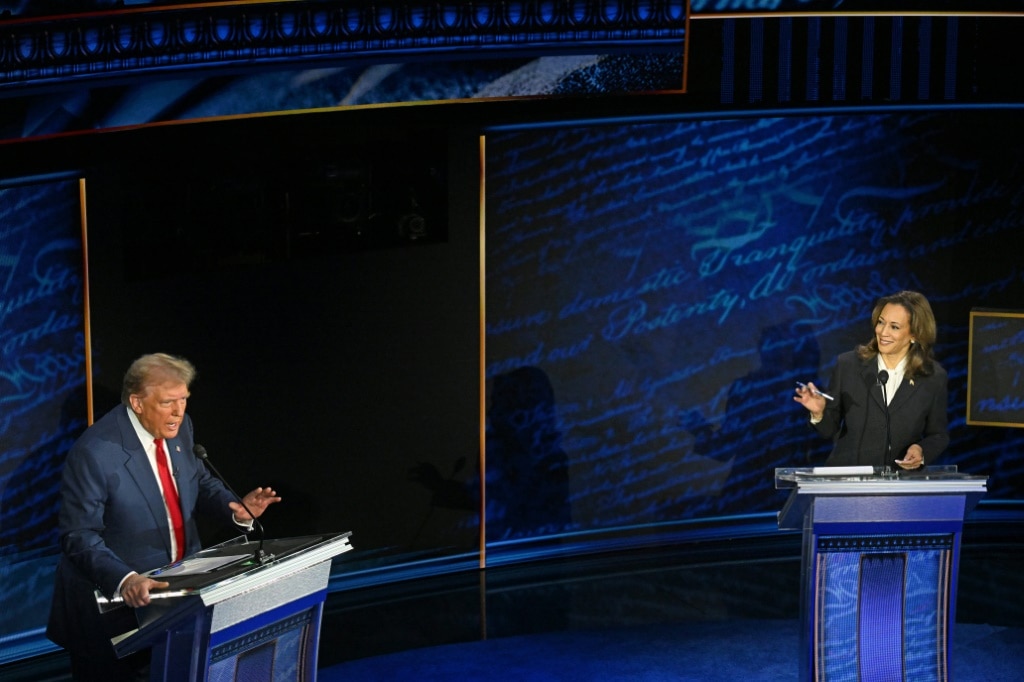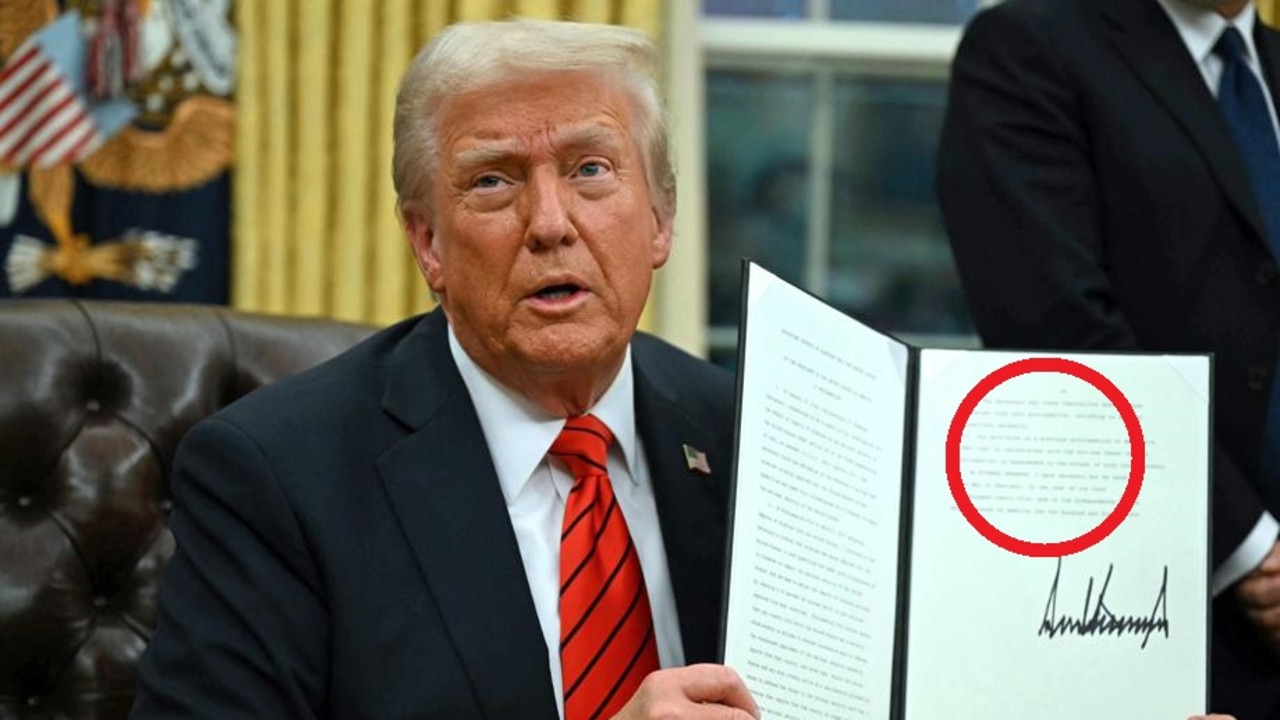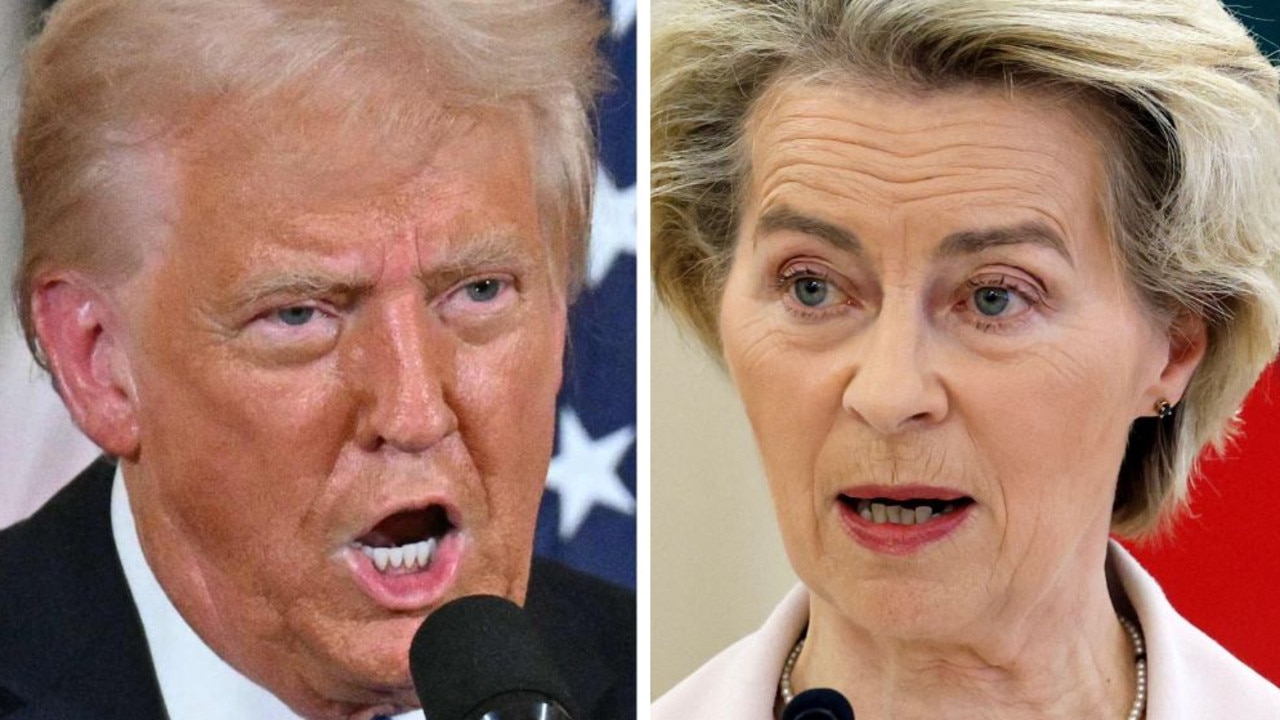Kamala Harris v Donald Trump: How will Australia fare under new US President?
The US election is just weeks away – and an expert has revealed the grim reality of what President Trump would mean for Australia.
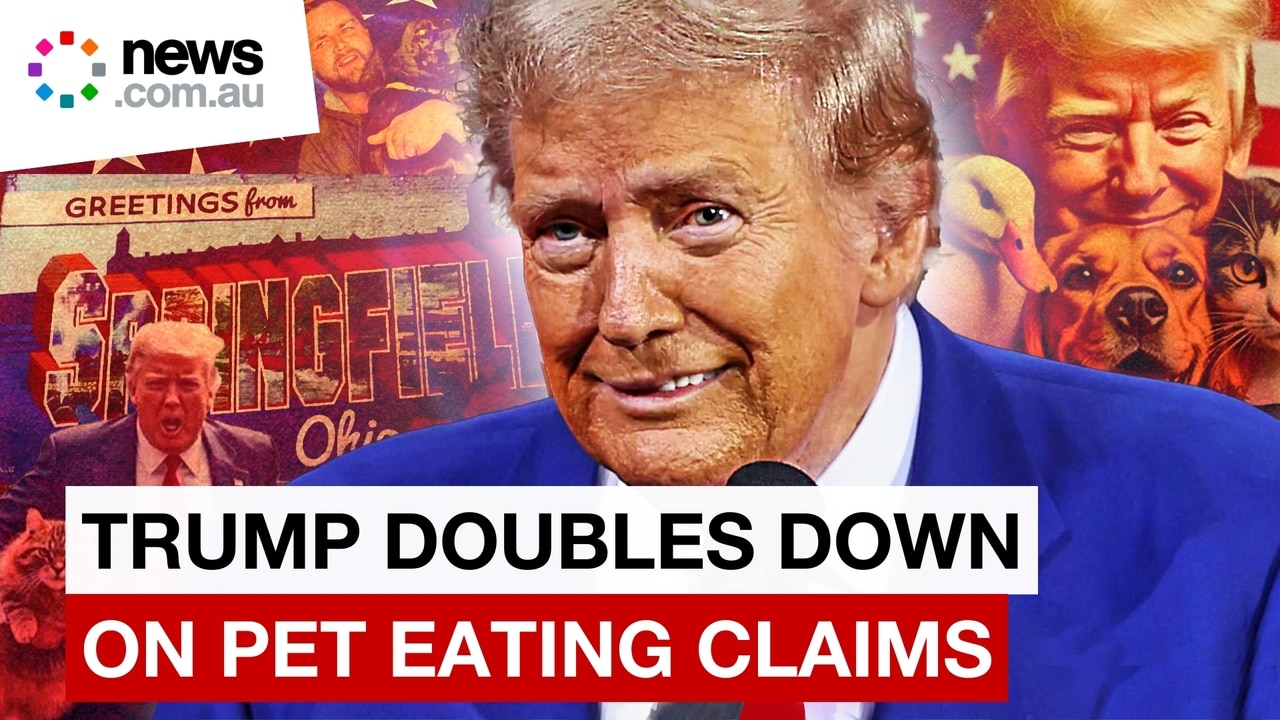
World
Don't miss out on the headlines from World. Followed categories will be added to My News.
The first US presidential debate is over between Republican nominee Donald Trump and Democratic nominee Kamala Harris.
But while both sides argue the toss over who came out on top, we are looking ahead to how Australia might be affected by a change in the White House.
News.com.au spoke with Dominic O’Sullivan, Professor of Political Science at Australia’s Charles Sturt University, to get an idea of what lies in store for the nation, and how trade, immigration, defence and bilateral relations may change under a new president.
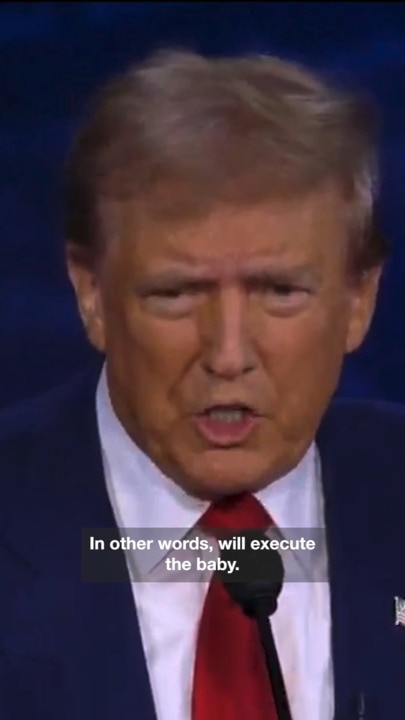
Trading places
It varies depending on the year and the economy, but Australia ranks somewhere between 20th and 30th among US import partners, so we are not a top-tier trading partner.
Nevertheless, Australian exports to the US are still around several billion dollars annually. Manufacturing (pharmaceuticals, machinery), agriculture (beef, lamb, wine) and minerals (iron ore, coal) are the key sectors.

If re-elected, Donald Trump said he would increase import tariffs to protect American industries.
“(This) will have a significant effect, simply because it makes the cost of Australian produce higher, which can therefore potentially reduce demand, or perhaps transfer some of the costs to Australian exporters. Either way, it has an impact on profitability,” Prof O’Sullivan said.
He said it will also have an impact for many other countries as well.
“We could see other countries retaliate and then we get to a trade war kind of situation. And all those things help to push inflation up and therefore interest rates. So the economic impact on Australia – and indeed on much of the rest of the world – could be quite significant.”
So how can Australia protect itself more from these changes?
“Diplomacy comes into play,” Prof O’Sullivan said.
“Australia, like the US and most other trading nations, has very good trade negotiators. But their skills will certainly be tested in a way they’re not being tested at the moment.”
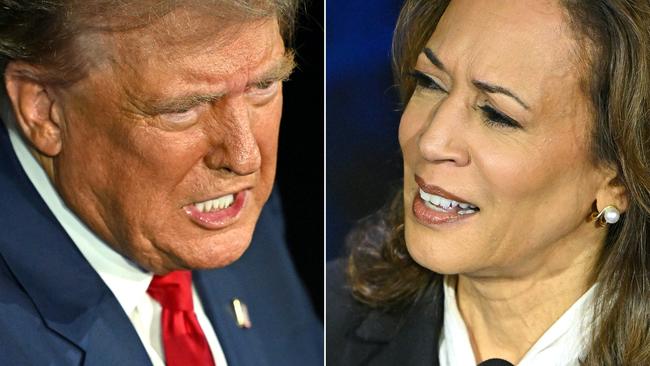
Economy seats
A narrative of economic strength was created during most of Trump’s one-term presidency as a result of his policies on taxes, deregulation and trade. Plus, he had the stock market on his side, with record highs for major indices like the Dow Jones, S & P 500 and NASDAQ. However, the tax cuts disproportionately benefited the rich. And, in addition to causing tensions with China, his tariffs caused some goods to be more expensive.
Indeed, Professor O’Sullivan was not particularly impressed or emboldened by Mr Trump’s economic record.
“I don’t think the economic record of the first Trump presidency is particularly good,” he said. “Obviously, Covid helps explain that. So, he’s not the kind of bloke that has the vision for making people’s lives better. And that ultimately is supposed to be the purpose of politics.” On the flip side, Ms Harris’ economic record remains as yet untested.
The perception that President Joe Biden’s second term has not been strong on the economy is based on challenges such as high inflation, rising interest rates and volatility in energy prices – all issues Australia is facing itself.

When the boats come in
Typically, around 8000 to 10,000 Australians move to the US annually, based on immigration statistics. The number of Americans emigrating to Australia each year can fluctuate based on changes in immigration policies and economic conditions in both countries, but it sits at around 3000 to 5000 coming the other way.
“Perhaps what is significant with regards to immigration is the strength of Trump’s anti-immigration rhetoric; and it is just rhetoric, because the Biden administration is quick to point out that the reason people are crossing the US-Mexico border in great numbers is because Trump prevailed on the Republicans to block legislation that would have allowed the government to address that more effectively from its point of view, “ Prof O’Sullivan said. “So, it is a lot of noise. But noise matters in politics. We’re already seeing immigration developing as an election campaign here with the reduction in international student numbers perhaps being motivated by the Government wanting to pre-empt the Opposition making immigration a big election issue, taking it off the political agenda.
“People tend to forget that both Australia and the US are largely immigrant populations anyway, always have been, since the first colonisation, and are economically dependant on immigration to fill labour shortages – it’s nothing new.
“I guess, for some people, the trade-off between racism and economic security in economic growth and so on is one where racism wins. And that’s certainly the Trump rhetoric. And I think those sorts of ideas and noise that he presented in the United States, they do have an influence on people’s thinking here.”.
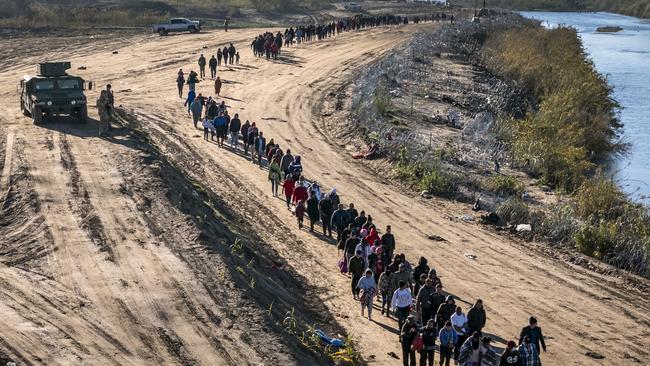

War on peace
“One of the biggest concerns for me about a Trump victory for Australia is the wisdom of Australia being so closely tied to the US militarily through the AUKUS agreement,” Prof O’Sullivan said. AUKUS is a trilateral security agreement between Australia, the United Kingdom and the US, announced in September 2021.
As part of its primary focus, it helps Australia acquire nuclear-powered submarines by providing technology and capabilities. Also included in the agreement are collaborations on artificial intelligence, cyber capabilities, quantum technologies and undersea warfare. China’s growing influence is a major factor contributing to the rise of AUKUS.
“I think if you’ve got an unstable, authoritarian president, there’s perhaps a relationship that’s just a bit too close to be in Australia’s interests. Maybe with a more conventional Republican president or a Democratic president, one perhaps wouldn’t say that, but under Trump I think it’s really not a military alliance that one should approach without extreme caution,” Prof O’Sullivan said.
He also warned of Mr Trump’s commitment to weakening NATO.
“He’s not really interested in offering support to Ukraine against the Russian invasion, and one wonders whether that may perhaps encourage China to move into Taiwan,” he said.
“Australia’s obviously a very long way from NATO, but Australia has provided limited amounts of support to Ukraine, and I guess if the US is also not supporting, then Ukraine’s position becomes very difficult to support, so it could get to the point where’s there’s just no point in Australia continuing to support Ukraine. But we’re a long way from that. It would depend on what NATO does.
“Certainly, in Europe, people are preparing for a Trump victory, and no doubt there’d be strategies that will unfold if they need to. But that’s all speculative at the moment.
“To have that level of insecurity on our doorstep would be significant, and China’s obviously got interests in the Pacific that are not necessarily consistent with Australia’s and without the United States as a reliable ally in the Pacific, then that’s not good for Australia either.”

A matter of trust
Professor O’Sullivan said Mr Trump’s style of politics emboldens a dishonesty in other parts of the world, adding: “We actually saw that during the Voice Referendum campaign last year, where a lot of Trump campaign techniques were employed by the ‘No’ side, and it’s a world where truth doesn’t matter.”
“Because we’re so close to the United States in many social and cultural ways – we watch a lot of US television, for example – and we seem to know rather a lot what goes on in that country’s politics, society and culture, and that influences our own,” he said.
“There’s an authoritarianism too, that is coming through in Trump’s rhetoric – he’s going to throw everybody in jail, and those kinds of things, and it really just shows the fragility of American democracy, and one likes to think that Australian democracy is a little more robust.” He added: “But it hasn’t been tested in that way, so we can only speculate on what might happen and I certainly think that some people in the Coalition are perhaps more philosophically aligned to Trump, but then again, the Liberal Party has always been a free trade party, and it’s always seen Australia’s economic interests as very much tied to free trade arrangements, so there’s probably really not much difference between the Liberal and Labor parties on that front; they’d both be seeking to protect Australia’s interests.”

On the balance
“A Trump victory both from a policy perspective in terms of trade, but also from a personality perspective in terms of the authoritarian approach to politics that he takes, it would be better for Australia if he weren’t to succeed,” Prof O’Sullivan said.
“I think if there’s a Harris victory, the Australian-US relationship will remain more or less what it is. There won’t be the tensions – both economically and from a security perspective – that a Trump victory would bring about.”
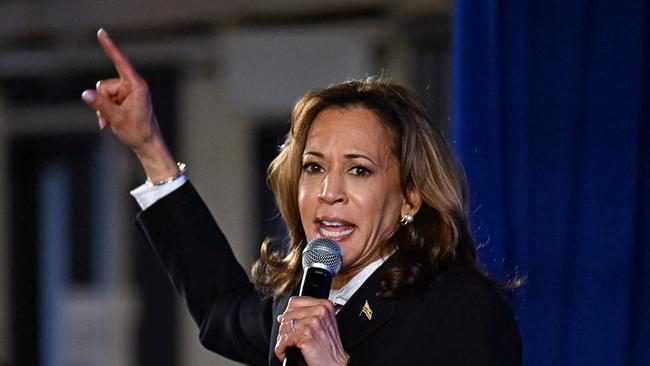
Keeping up appearances
So which presidential candidate are we more likely to see visit our shores once they are inaugurated?
“It’s a very long time since a US president visited Australia,” Prof O’Sullivan said.
“I don’t think it would be high on the agenda for either candidate.”
The last US president to visit Australia was Barack Obama, who attended the G20 Summit in Brisbane almost a decade ago in November 2014.
Lyndon B. Johnson (1966), George H. W. Bush (1991), Bill Clinton (1996), George W. Bush (2003, 2007), and Mr Obama (2011, 2014) have all visited Australia during their terms in office.
“Australia’s an important partner to the United States, but certainly not one of the most important, and also Trump’s America First ideas really mean the rest of the world doesn’t matter too much,” Prof O’Sullivan said.
Andrew Banks is a freelance writer.
More Coverage
Originally published as Kamala Harris v Donald Trump: How will Australia fare under new US President?


